Ljubljana related
STA, 2 October - Slovak developer Corwin is planning to build a housing estate in the Ljubljana borough of Šiška. Construction works on what is a EUR 45 million investment are expected to be launched in the first half of 2020 and the first residents could move in at the end of 2022.
The Kvartet housing estate will be built by Šiška Rezidence, a Slovenian company owned by Corwin, near another larger housing estate, Celovški Dvori.
The location of Celovški Dvori estate, which is near the planned development
It will feature four 16-storey towers with a total of 221 flats, as well as areas for some 500 bicycles and an underground car park for some 300 vehicles.
Playgrounds for children and a socialising area for residents are also planned in the green areas around the buildings, Corwin said in a release on Wednesday.
Roman Karabelli, director of Corwin's Slovenian subsidiary Corwin SI, sees Kvartet as a major investment to revitalise what used to be an industrial area near a new large shopping centre planned by retailer Spar.
Kvartet will feature one-, two-, three- and four-room apartments, 33 apartments will be made to suit older people or the disabled, and all residents will have a view of the Alps.
Kvartet has been designed by Ljubljana's architecture studio Ofis Arhitekti, with which Corwin cooperated already on an office and housing complex in Slovakia's Bratislava.
The Slovak developer is now waiting to be granted a building permit, which it expects in the first half of next year.
Corwin bought the 7,000-square-metre plot in Ljubljana in March 2018 from Slovenia's bad bank, where it ended as part of a bankruptcy estate of builder GPG Inženiring.
The asking price was EUR 2.7 million, while the final price was not disclosed, but Corwin says the investment is worth more than EUR 45 million.
It will be financed with own capital and a loan. "We're already discussing financing with some banks in Slovenia," Karabelli told the newspaper Delo today.
Together with the plot, Corwin also acquired GPG Inženiring's plans for a residential development with 180 flats, but eventually changed it considerably.
Karabelli told Delo the company was already looking for new plots and was planning at least one to two new projects in Slovenia.
"We trust in the Ljubljana property market and we believe we have something to offer," said Karabelli, noting the company has rich experience, having built more than 2,000 flats in ten years.
According to Delo, Corwin was set up slightly more than ten years ago and is a leading developer in Slovakia.
STA, 1 October 2019 - A group of 32 MPs has requested that the Constitutional Court review the property mass valuation act. The request, distributed to the press on Tuesday by the opposition New Slovenia (NSi), says that the valuation models used for the estimates, set to serve as basis for a property tax, should have been closely defined by the act.
The models are key in determining the taxpayers' position and must thus be prescribed by the law and not by executive acts, the review request says.
The issues found unconstitutional by the Constitutional Court in 2013 still remain after the act was changed in May 2019, the request says.
The court found in 2013 that the act failed to define individual valuation models and the application of models in value estimated of different types of real estate.
The act also failed to define "actual use of buildings or parts of buildings" and did not define individual types of actual use, the request notes.
The NSi has called a press conference for tomorrow, featuring MP Iva Dimic and the NSi's farmers' branch head Janez Beja.
One of the points in the request says that the valuation system has been set up in a way that will force farmers to sell agricultural land whose purpose is classified as building land.
The act envisages that the value of this type of land be estimated based on classification by purpose, rather than actual use, which would lead to higher taxes. The request says that this will force farmers to sell the land, and to development of agricultural land.
Meanwhile, the Mapping and Surveying Authority (Geodetska uprava Republike Slovenije – GURS) released today preliminary results of mass valuation of property. The results could be used for a number of purposes, including a real estate tax.
However, Prime Minister Marjan Šarec told the MPs in a Q&A today that the government, "in its current constellation is not capable of passing a real estate tax".
STA, 23 September 2019 - Sales of new housing properties have dropped to the lowest level on record in the second quarter of 2019, according to data released by the Statistics Office. Meanwhile, more than 1,360 second-hand houses were sold this second quarter, the most since the second quarter of 2017. In total, sales reached highest value since 2017.
New flats are on the other side of the spectrum, as only 42 were sold, the least since new real estate sales have been recorded. But faring even worse were new houses, with only 18 of them being sold in the second quarter.
The prices of new housing properties dropped by 3.1% over the first quarter. Prices of new houses went down by 9.3%, while apartments grew by 0.3% after growing by 9% in the first quarter.
On the yearly level, prices of new real estate increased by 3.6%: flats went up by 9.3%, while houses were 6.3% cheaper.
Prices of second hand real estate went up by 1.5% over the previous quarter; houses by 2.5% and apartments by 1%. Compared to the same period last year, prices of second-hand properties were up 2.1%; apartments increased by 2.3% and houses by 1.7%.
In total, EUR 330 million deals were closed, the most since the second quarter of 2017, when the figure reached EUR 354 million.
Prices have gone up by 1.3% in the second quarter compared to the first and have grown by 2.2% compared to the same period last year.
Statistical Office of the Republic of Slovenia, SURS, has released figures showing that construction firms performed €2,571 million of construction work in 2018, an increase of 29% on in 2017.
Of this, €1,351 million of construction work was done on buildings (up 35% on 2017) and €1,220 million on civil engineering projects (up 23%).
Most of this construction work was performed on non-residential buildings (€906 million, or 38% more than in 2017).
You can find more about this data at SURS, while all our stories on property in Slovenia are here, while all our statistics are here
STA, 15 August 2019 - Slovenia's construction industry is seeing growth for the third year now. Nevertheless, it has still not returned to the levels before the crisis, while some indicators suggest that the growth trend could be reversed in the near future, finds a report by the Statistics Office.
Construction is one of the sectors that was hit hardest by the crisis ten years ago. While most of other sectors, such as industry, commerce and services, have already exceeded pre-crisis turnover, construction still lags far behind.
"After a significant fall in both the turnover and the number of employees and enterprises after 2008, growth was detected again in all three indicators after 2013, especially in 2017 and 2018," reads the statisticians' report.
While the number of construction enterprises has already reached the pre-crisis figures, with 19,220 such enterprises in 2018, the turnover and the number of employees still fall considerably short.
At the expense of the small number of workers, labour productivity increased and amounted to EUR 24,925 in 2018, exceeding the pre-crisis levels.
Construction companies generated a turnover of almost EUR 6 billion in 2018, which is almost 30% less than in 2008 and 34% more than in 2013. Almost half of the turnover was generated by specialized construction activities, 30% through construction of buildings and 21% by civil engineering.
There were 67,600 people working in the sector last year, compared 89,900 people a decade ago. 70% of the workers were Slovenian citizens and 30% foreigners. Most of the foreign workers came from Bosnia and Herzegovina, followed by those from Kosovo, North Macedonia, and Croatia.
Among the 19,220 construction enterprises registered in 2018, micro-enterprises with up to 10 employees prevailed, representing more than 90%. Compared to 2008 there were more than a half fewer medium-sized and large enterprises, however, in this period the number of parent enterprises doubled, which means that smaller enterprises which are interconnected prevail.
Wages in the sector had been increasing until 2011, but fell somewhat between 2011 and 2015, and after 2015 increased again. Average gross monthly pay was EUR 1,290 last year, which is 12% less than in 2008 and 23% less than the national average, despite a 20% growth compared to 2017.
Data on the number of the building permits and the construction confidence indicator suggest an impending decline. The number of building permits issued declined over the past three years and the trend continues in 2019 - in the first half of this year 10% fewer building permits were issued compared to the same period in 2018.
Only the number of residential building permits is somewhat increasing, whereas the number of non-residential building permits issued is falling. Between 2016 and 2018 the surface area of buildings for which building permits were issued increased (8%), as did the number of the apartments in those buildings (by more than 19%).
In the first six months of this year the construction confidence indicator was below the average of the previous year. Expectations for contracts and jobs peaked at the beginning of 2018, but then began to fall. The only exception was the indicator assured work in hand which in the first six months of 2019 was constantly above the average of the previous year.
As limiting factors to doing business, construction companies report in particular the shortage of skilled workers, fierce competition and high labour costs.
STA, 14 August 2019 - The value of construction works in Slovenia rose by 14.4% in the first six months of 2019 year-on-year, shows data released on Wednesday by the Statistics Office. Following a rise in May, the value of construction works decreased by 6.7% in June over the previous month.
In the first half of the year the value of works on buildings rose by 11.9%, whereas the value of works on engineering objects was up by 15.1% compared to the same period in 2018.
Compared to May, the value of works on buildings was down by 8.8% in June and of works on engineering objects by 6.4%.
The year-to-year comparison for June on the other hand shows a 5.4% overall increase for the industry. Standing out is a 9% increase for non-residential buildings, whereas the value of works on residential buildings decreased by 2.1% in June year-on-year.
More details on this data can be found here
STA, 12 August 2019 - More than 60 real estate agencies asked the Constitutional Court on Monday to review a recently adopted bill that limits commission fees for leasing real estate and other costs which real estate agencies can charge their clients.
According to Boštjan Udovič from the Chamber of Commerce and Industry (GZS), the 66 agencies involved want the top court to review and stay provisions limiting service commissions.
They argue the bill encroaches on the right to engage in free enterprise and the right to property, meaning it also violates the European Convention on Human Rights as well as EU law.
"The legislator failed to demonstrate any public benefit that would justify such an intervention in the rights of the plaintiffs. The goals allegedly pursued are general and have to do with housing policy and not with property brokerage," Udovič told the STA.
The legislative changes, originally passed on 11 July and again a week later following a National Council veto, entered in to force on 10 August and protect tenants against paying commissions for services provided by a real estate agency which was hired by the landlord.
They also introduced cap on commissions that can be charged by apartment rental agencies; the capped amount corresponds to one monthly rent, but should not go lower than 150 euro.
Where did you live before Slovenia, and what brought you here?
Before Slovenia, my husband and I were living in London. Despite both of us working in the city, we always had a hand in property development. In 2004, when many countries joined the EU, we started looking at our options to invest aboard. We stumbled across Slovenia on a map and were mesmerized by its locations. We knew straight away this would be a great place to have a vacation home as its proximity to all the other countries and small size made getting away relatively easy. This was going to be our base camp for many adventures. Little did we know at the time that we would call this place home for the next 12 years.
A television interview with Jade van Baaren
How did you start looking for work here, and what was that experience like?
I think I came here with an idea of what I would do, but this quickly changed. I think that you have to be willing to be flexible and find what the country lacks and what you can offer. I have noticed with a few people that I know that they also came here with big ideas of what would work, but soon found out that they had to do a bit if soul searching and work hard to make a go of it here.
What’s your business, and how long have you been running it?
I am a renovation project manager and also run JVB Designworks. A company that consists of architects and design consultants. We run projects from start to finish for our clients, offering full renovations and design with a turnkey finish.
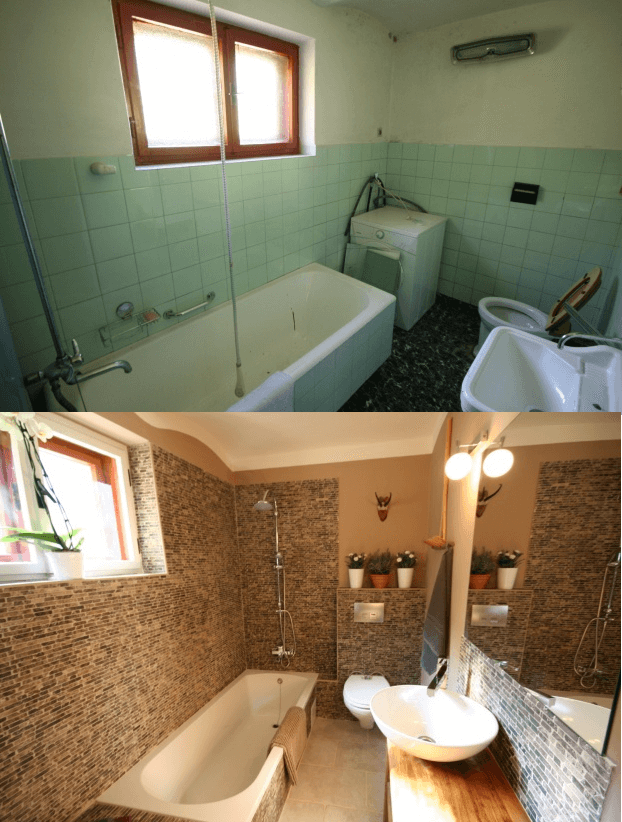
What was your experience of starting a business here?
Like any new business it was a lot of hard work with a strong learning curve. I had to get the right people in the right place for it all to run smoothly. Now, after many years, we are reaching this point. However, in the construction and design business you will always encounter challenges, but that’s what I love about the job.
What kind of problems can you help people solve?
After many years in the business I have a lot of knowledge, not just of construction and design issues, but also in finding out who the client is and what they are really looking to get out of the project. Most of my projects are for the rental market, so I also have to know what the market is wanting, expecting and needs. Many of our projects are in idyllic but remote spots in Slovenia. These can be the most breathtaking places to relax and enjoy nature in all its grandeur, but can also be the most challenging spots for construction, electrical works, plumbing and water.
So most of my projects come with challenges, but for me it’s like an unsolved puzzle. There is always a solution, the trick is to approach problems from many different angles.
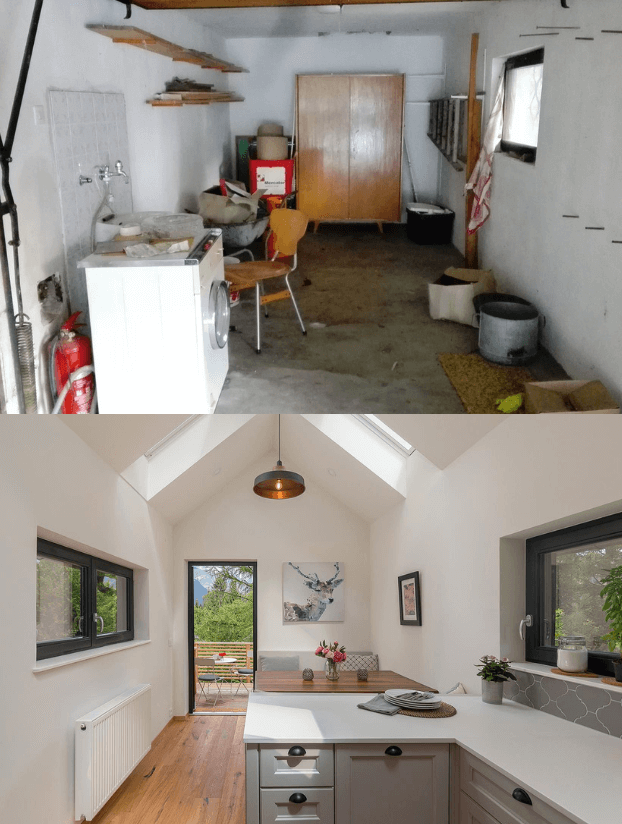
How are you qualified to solve these problems?
It takes a big team to solve all these problems, and I can say that I have throughout the years found the best people in their fields to help us solve various issues. I’ve been working in Slovenia on renovations for 12 years now, starting with our own place when we first moved here. I have architects, engineers and construction specialist, all part of the JVB Designworks team who play a role in the problem-solving process. However, I think my own many years working and living in so many different countries have given me the ability to see things from many different angles, and I would say that problem solving is one of my biggest strengths.
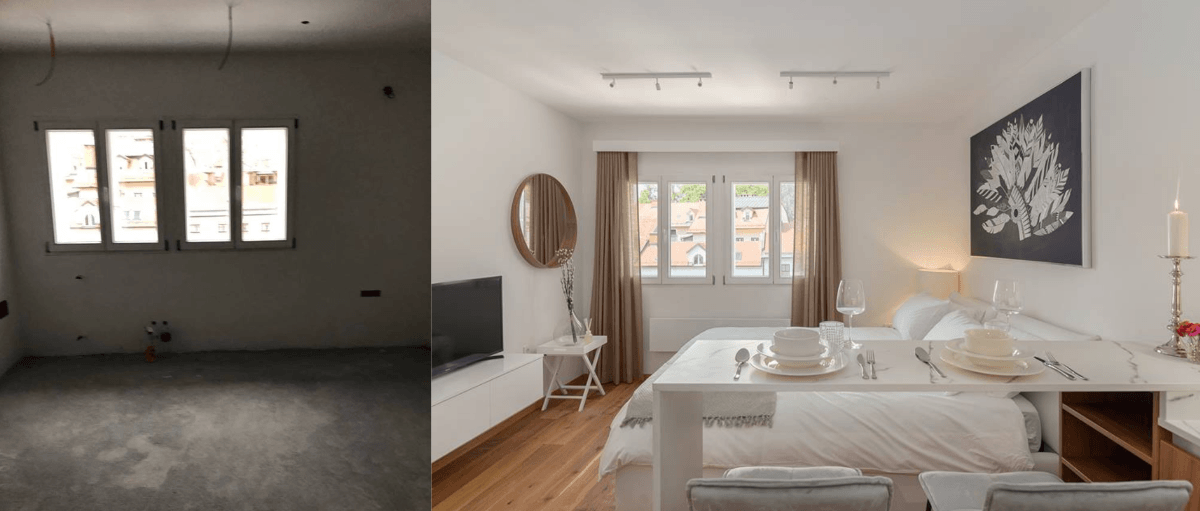
How has the business changed over the years, and what are your plans for the future?
Well it’s grown, that would be the biggest change so far. More clients investing in Slovenia are now interested in restoring older properties, which is my specialty.
With regard to the future, I have lots of ideas in the pipeline that are not ready to be shown yet, but I’m always just looking to run things more efficiently, keeping up with the latest eco-technology so these places can run better and be more affordable. And always getting to know the rental market better.
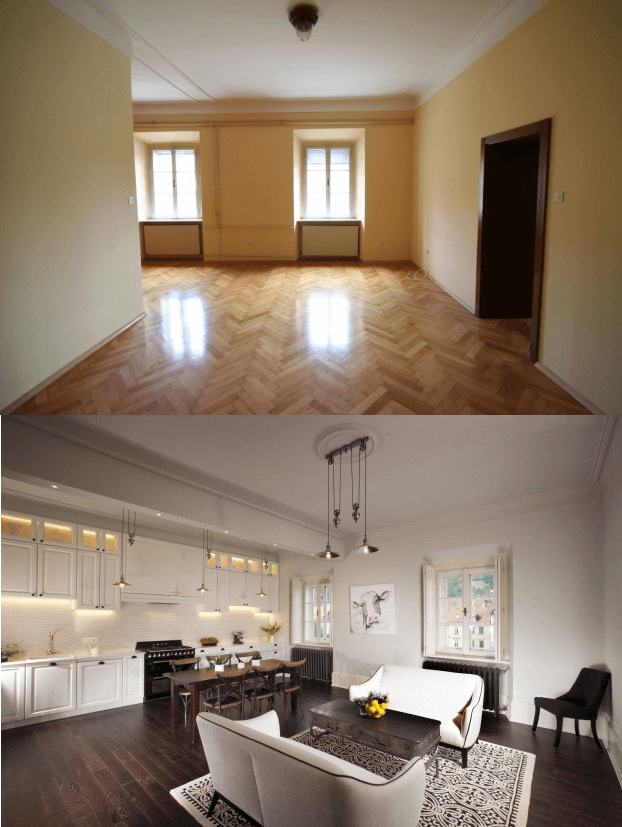
Where can people find out more about your work?
My Facebook page has all my latest and greatest projects. I like to often show off these magical places I get to work in and the fun side of renovations. We love before and after pictures, as the transformations is huge. It’s hard to keep this up on my website, so Facebook is the best place to view all current projects.
What was your experience of culture shock in Slovenia?
It was very hard at first to live here. I found that the people where naturally suspicious of our intentions. Slovenian’s are very family oriented, and as an outsider it is very hard to break into social circles. Coming from a vibrant city like London, where we had a big social scene with lots going on, and then moving here where we had little interaction with anyone – I think that was the biggest shock for me, and something I didn’t think about when moving here. I have moved many times in my life, more than most, and never came across such a closed culture.
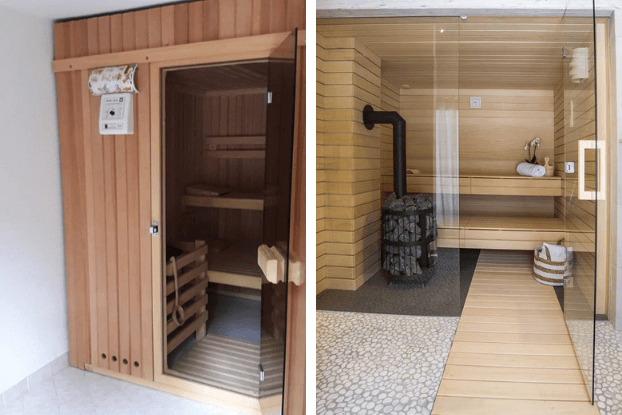
What are some things from Slovenia that you think your home country could benefit from?
I think Slovenians approach to conservation and environmental issues is something that a lot of countries could befit from. It is true that Slovenia is a small place, and this can be a benefit when implementing environmental measures. They love the outdoors and have great respect for nature.
And what are some thing from your home country that you think Slovenia could benefit from?
I would like to see the Slovenians have a bit more of an open mind and be more trusting, as I think this is just a better way to live.
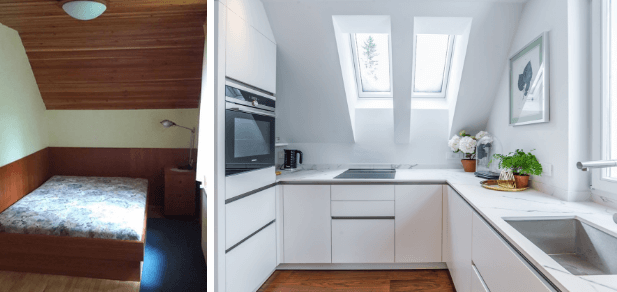
Have you learned Slovene?
This is a touchy subject. I have been trying to learn Slovenia for years. I have taken courses, but to be honest starting and running my business and having a family have taken priority. If it came easy that would be another story, but It does not, and I would have to spend a lot of time to perfect it. I can get by but it’s very basic.
What things frustrate you about life in Slovenia?
I kind of love to call it SLOWvenia. In contrast to places like NYC and London, were life runs at a very fast pace and its expected to have immediate results, things just move at a different pace here, a slower pace. That used to frustrate me, but after 12 years I have adapted to this way of life, almost.
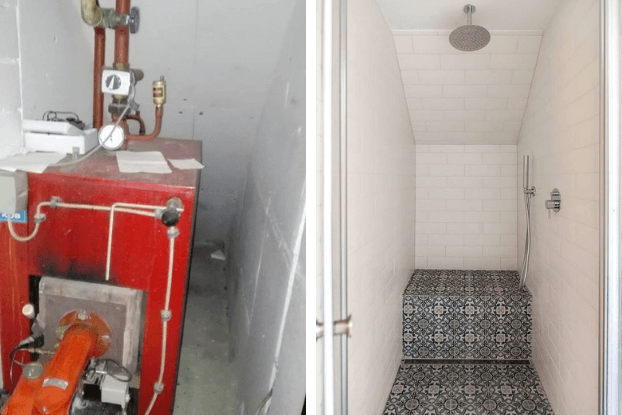
What things delight you?
The quality of life for my children. I know they are in the best place in the world for growing up, growing up, learning values and most of all they are in a safe environment
Do you think you’ll stay in Slovenia for the rest of your life?
Well I would never say that about any place due to my history. But so far I’ve lived longer in Slovenia than anywhere else.
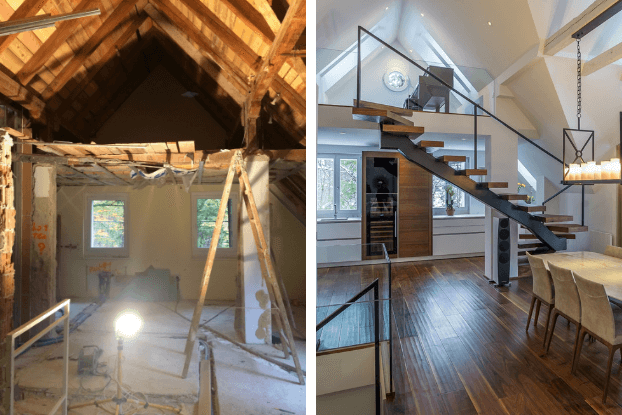
Would you advise a friend to move to Slovenia?
Not if you’re young, when you should go out and be pushed around by the big players, get experience, be challenged, work hard. Then come here and raise a family. Be a big fish in a small pond.
What do you wish someone had told you before you moved here?
Nothing, or else I don’t think I would have come if I’d known how difficult it was going to be. Many times, we almost packed it in. I would say the first six years I was very close to jumping on a plane and getting out of here. But now I am doing what I love, and my family is happy and healthy.
As well as the links throughout this story, you can see more of Jade and her team’s work at JVB Designwork’s website.
STA, 15 July 2019 - A bill to limit commission fees for leasing real estate and other costs which real estate agencies can charge their clients was vetoed by the National Council on Monday.
The veto comes as real estate agencies have vehemently protested the bill and have threatened to petition the Constitutional Court.
Under the changes to the act on real estate agency tabled by the Left, landlords would fully pay the commission fee charged by a real estate agency for a service commissioned by them.
This means tenants would no longer shoulder part of the fee, tackling one of the biggest complaints by individuals - the fact that tenants pay a fee for a service they have not commissioned.
A cap would also be imposed on the commission fee that can be charged by apartment rental agencies to landlords. The capped amount would correspond to one monthly rent but would not be lower than 150 euros.
The restrictions apply only to rental to individuals, business-to-business transactions are exempted.
Councillor Mitja Gorenšček, who led the veto initiative, argued today that the proponents of regulation should be targeting other fields on the market and not an area that the average persons encounters once or never in their life.
The Left's Luka Mesec begged to differ, arguing Slovenia had not developed a long-term flat renting market, with most tenants signing 12-month contracts and then being forced to pay for a service they did not commission every few years.
While the Left argued one of the goals of the bill was to enable people affordable housing, Gorenšček said the real problem was insufficient supply and that this was where the state should intervene with measures. He however also echoed the claims of businesses that the bill was an encroachment on the free market.
Environmental and Spatial Planning Ministry State Secretary Marko Maver however also came out in the defence of the bill, saying it followed housing policy guideline. He said it would increase accessibility and also encourage long-term contracts.
Meanwhile, the bill also introduces EU rules in acquiring qualifications for a real estate agent; Slovenia had already received a warning about a delay from the European Commission.
The Left is confident the bill receive the absolute majority needed in the National Assembly to override the veto.
All our stories on property in Slovenia are here
STA, 12 July 2019 - A bill to limit commission fees for leasing real estate and other costs which real estate agencies can charge their clients was endorsed by the National Assembly on Friday amidst protests by real estate agencies, which have threatened to petition the Constitutional Court.
Under the changes to the act on real estate agency tabled by the Left, landlords would fully pay the commission fee charged by a real estate agency for a service commissioned by them.
This means tenants would no longer shoulder part of the fee, tackling one of the biggest complaints by individuals - the fact that tenants pay a fee for a service they have not commissioned.
A cap would also be imposed on the commission fee that can be charged by apartment rental agencies to landlords. The capped amount would correspond to one monthly rent but would not be lower than 150 euros.
The restrictions apply only to rental to individuals, business-to-business transactions are exempted.
The Left believes tenants in apartments leased at market prices should benefit the most since they will no longer have to pay commission fees for the services they have not commissioned and since landlords would be encouraged to rent out their apartments for longer periods.
The bill also introduces EU rules in acquiring qualifications for a real estate agent; Slovenia had already received a warning about a delay from the European Commission.
While the motion received wholehearted support from the government and the Consumer Protection Association, businesses have been up in arms over what they say is encroachment on the free market.
Representatives of real estate agents, who even took out whole-page ads in newspapers to protest the bill, said it was inadmissible for anyone to limit the price of a service available on the free market.
The Chamber of Commerce and Industry (GZS) has said there is enough competition on the market and citizens are not obliged to use this service.
Fewer than 50% of real estate transactions are made through real estate agents, which GZS sees as proof that tenants are not forced to shoulder the commission fee for the service.
The GZS's section of real estate agents has said it will report Slovenia to the European Commission and probably ask the Constitutional Court to review the bill.





